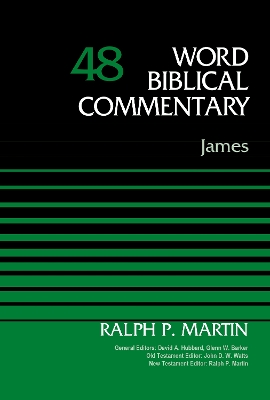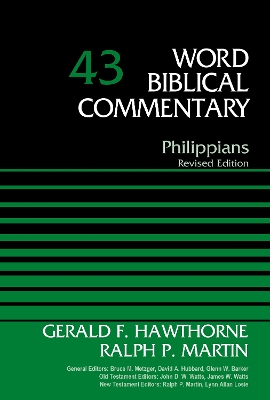Word Biblical Commentary
3 total works
The Word Biblical Commentary delivers the best in biblical scholarship, from the leading scholars of our day who share a commitment to Scripture as divine revelation. This series emphasizes a thorough analysis of textual, linguistic, structural, and theological evidence. The result is judicious and balanced insight into the meanings of the text in the framework of biblical theology. These widely acclaimed commentaries serve as exceptional resources for the professional theologian and instructor, the seminary or university student, the working minister, and everyone concerned with building theological understanding from a solid base of biblical scholarship.
Overview of Commentary Organization
- Introduction—covers issues pertaining to the whole book, including context, date, authorship, composition, interpretive issues, purpose, and theology.
- Each section of the commentary includes:
- Pericope Bibliography—a helpful resource containing the most important works that pertain to each particular pericope.
- Translation—the author’s own translation of the biblical text, reflecting the end result of exegesis and attending to Hebrew and Greek idiomatic usage of words, phrases, and tenses, yet in reasonably good English.
- Notes—the author’s notes to the translation that address any textual variants, grammatical forms, syntactical constructions, basic meanings of words, and problems of translation.
- Form/Structure/Setting—a discussion of redaction, genre, sources, and tradition as they concern the origin of the pericope, its canonical form, and its relation to the biblical and extra-biblical contexts in order to illuminate the structure and character of the pericope. Rhetorical or compositional features important to understanding the passage are also introduced here.
- Comment—verse-by-verse interpretation of the text and dialogue with other interpreters, engaging with current opinion and scholarly research.
- Explanation—brings together all the results of the discussion in previous sections to expose the meaning and intention of the text at several levels: (1) within the context of the book itself; (2) its meaning in the OT or NT; (3) its place in the entire canon; (4) theological relevance to broader OT or NT issues.
- General Bibliography—occurring at the end of each volume, this extensive bibliographycontains all sources used anywhere in the commentary.
The Word Biblical Commentary delivers the best in biblical scholarship, from the leading scholars of our day who share a commitment to Scripture as divine revelation. This series emphasizes a thorough analysis of textual, linguistic, structural, and theological evidence. The result is judicious and balanced insight into the meanings of the text in the framework of biblical theology. These widely acclaimed commentaries serve as exceptional resources for the professional theologian and instructor, the seminary or university student, the working minister, and everyone concerned with building theological understanding from a solid base of biblical scholarship.
Overview of Commentary Organization
- Introduction—covers issues pertaining to the whole book, including context, date, authorship, composition, interpretive issues, purpose, and theology.
- Each section of the commentary includes:
- Pericope Bibliography—a helpful resource containing the most important works that pertain to each particular pericope.
- Translation—the author’s own translation of the biblical text, reflecting the end result of exegesis and attending to Hebrew and Greek idiomatic usage of words, phrases, and tenses, yet in reasonably good English.
- Notes—the author’s notes to the translation that address any textual variants, grammatical forms, syntactical constructions, basic meanings of words, and problems of translation.
- Form/Structure/Setting—a discussion of redaction, genre, sources, and tradition as they concern the origin of the pericope, its canonical form, and its relation to the biblical and extra-biblical contexts in order to illuminate the structure and character of the pericope. Rhetorical or compositional features important to understanding the passage are also introduced here.
- Comment—verse-by-verse interpretation of the text and dialogue with other interpreters, engaging with current opinion and scholarly research.
- Explanation—brings together all the results of the discussion in previous sections to expose the meaning and intention of the text at several levels: (1) within the context of the book itself; (2) its meaning in the OT or NT; (3) its place in the entire canon; (4) theological relevance to broader OT or NT issues.
- General Bibliography—occurring at the end of each volume, this extensive bibliographycontains all sources used anywhere in the commentary.
Pastors and students will appreciate this new edition with its up-to-date bibliography and discussion of pertinent issues. In this full revision and update of the book of Second Corinthians, Dr. Ralph P. Martin addresses the scholarly questions about the text of the epistle and the significance of Paul's thought for Christian living and ministry.
In a penetrating analysis of Paul's responses to the various crises within the Corinthian congregation, Dr. Martin gives insight into the particular problems of Christianity as expressed in the hedonistic, cosmopolitan setting of Corinth. He shows how Paul's attempt to clearly distinguish the gospel from Hellenistic Judaism and Hellenistic Jewish Christian ideology results in a moving statement of the Christian message. Rather than the "theology of glory" prevalent in Corinth, Paul articulates his theology of the Cross as a "theology of weakness," of servanthood and ministry. What was at stake at Corinth, says Dr. Martin, was "nothing less than the essence of the kerygma as in expressed in the way of the cross. . . for proclamation and daily living." New sections on the Collection and Rhetoric have been added, and the issues of Composition and Social Setting of the letter have been included, along with topics such as the Spirit, the Opponents, Paul's Theology, and the Resurrection in this epistle.
The Word Biblical Commentary series offers the best in critical scholarship firmly committed to the authority of Scripture as divine revelation. It is perfect for scholars, students of the Bible, ministers, and anyone who wants a theological understanding of Scripture.


